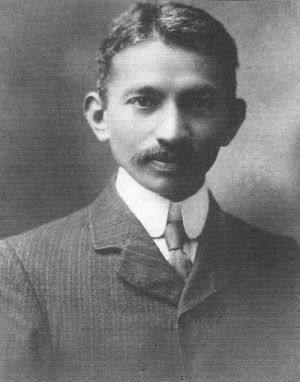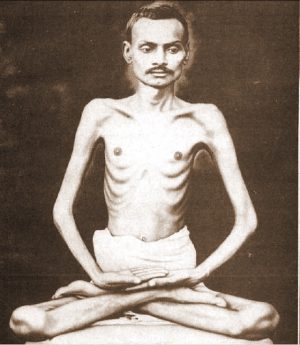Mahatma Gandhi’s philosophy of truth and nonviolence has influenced many great leaders worldwide. But before Gandhi became a historic figure, he himself was influenced by great men and great literature. Among the great personalities that inspired him were the poet and philosopher Raychandbhai and the social reformer, Gopal Krishna Gokhale. Gandhi looked at both men as his role models. Gandhi also had high respect for the Russian novelist Leo Tolstoy. He regularly exchanged letters with Tolstoy and shared the same beliefs with him. Both men admired the same wise men: Mohammed, Buddha, and Socrates. Gandhi was deeply affected by Tolstoy’s book, The Kingdom of God is Within You. The English philosopher and writer John Ruskin also captivated Gandhi’s heart and mind with his book, Unto This Last. Ruskin affected Gandhi so deeply that the Indian social reformer coined a word that represented Ruskin’s ideas and called it Sarvodaya. Besides these great men, Gandhi was also influenced by the Gita and the Bible.
Raychandbhai and Gokhale
Gandhi met Raychandbhai (also known as Shrimad Rajchandra) for the first time when he arrived home in India from London. Gandhi immediately felt that Raychandbhai was a man of great intelligence and that, like him, he was a lover of the truth. Gandhi observed that despite his daily business and concerns, Raychandbhai often had time for religious meditation. And so, Gandhi enjoyed the company of the poet. He looked at Raychandbhai as a spiritual advisor and felt that Raychandbhai would always instruct him in light of the truth. Raychandbhai served as Gandhi’s guiding light during his many spiritual crises.
Gandhi viewed Gopal Krishna Gokhale as a very different politician. Despite Gokhale’s agnosticism, Gandhi felt that Gokhale brought a lot of spirituality to politics, and this alone endeared him to the politician. He even described Gokhale as the “most perfect man in the political field.”
Leo Tolstoy
Gandhi exchanged many letters with Leo Tolstoy. Both men shared the same sentiments about peace and looked up to the same great men like Muhammad and Socrates. They also shared the same love for profound literature like the Upanishads, the Gita, and Sir Edwin Arnold’s Light of Asia. Gandhi and Tolstoy were philosophers who lived according to their beliefs. One of Tolstoy’s letters to Gandhi contained the Russian’s high regard for satyagraha in relation to the situation in South Africa. In turn, Gandhi was mesmerized by Tolstoy’s book entitled The Kingdom of God is Within You, making him an even more profound thinker. He felt that Leo Tolstoy was a seeker of the truth and a man of deep convictions. Scholars today agree that Gandhi and Tolstoy were prophets who lived in the same time period.
John Ruskin
The English writer John Ruskin influenced Gandhi through his book entitled Until This Last. Ruskin’s ideas contained in his book entranced Gandhi and left a permanent mark on his mind. Some scholars say that Ruskin’s book was perhaps the single most influential piece of literature on Gandhi’s philosophy of peace. During a train ride from Johannesburg to Durban, Gandhi was handed Ruskin’s book by a friend named Mr. Polak. Ruskin’s ideas so electrified Gandhi that he coined a term to summarize the sentiments contained in the book and called it Sarvodaya, meaning “the upliftment of all.” According to Gandhi, when he began to read the book, he was not able to put it down and was not able to sleep until he reached his destination. Gandhi expressed that he found in the book the deepest truths he held in his heart. Unto This Last contained an unusual criticism of capitalism. It threw aside the conventional theories of economics advanced by John Stuart Mill and Adam Smith. Ruskin rejected the theory that humans were influenced by the law of supply and demand, and instead, he put forth the idea that humans were motivated by their emotions. Ruskin asserted that the economic model of supply and demand degrades workers in a way that they are forced to sell their work for low pay in a competitive market. Ruskin drew the title of his book from chapter 20 of the Gospel of Saint Matthew.
The Gita
Gandhi discovered the Gita when he was a young man in England when theosophist friends handed him Sir Edwin Arnold’s The Song Celestial. The Song Celestial is Arnold’s rendering of a portion of the Hindu sacred book. The book profoundly affected Gandhi and convinced him that the Gita was the deepest source of truth. Consequently, he adopted its ideas and turned to them during difficult times. Gandhi developed his lessons of selflessness from the Gita and especially cherished the final 18 verses of its second chapter.
The Bible
The Christian Bible also influenced Gandhi, particularly the New Testament and the Sermon on the Mount. The renunciation of worldly desires by Jesus swamped Gandhi with joy. He developed his principle of satyagraha based on the Sermon on the Mount. Satyagraha, as Gandhi conceived it, is a form of nonviolent resistance, and Gandhi felt that the Sermon on the Mount contained this peaceful means of resistance. Gandhi stated that the New Testament opened his eyes to the value of nonviolence. He added that the New Testament is an instruction to achieve peace and lays down the hope that a time would come when swords would be useless and that the materials used to make swords would instead be used for meaningful purposes. He upheld Jesus as the originator of all nonviolent philosophies, who used the force of truth as a weapon. Gandhi further stated that Jesus defeated evil with good and conquered hatred with love by using forgiveness and gentleness. And so Gandhi was able to adopt the teachings of Jesus and create his own brand of public service. As a result, he was able to guide millions of Indians in their quest for independence from the powerful British empire.

